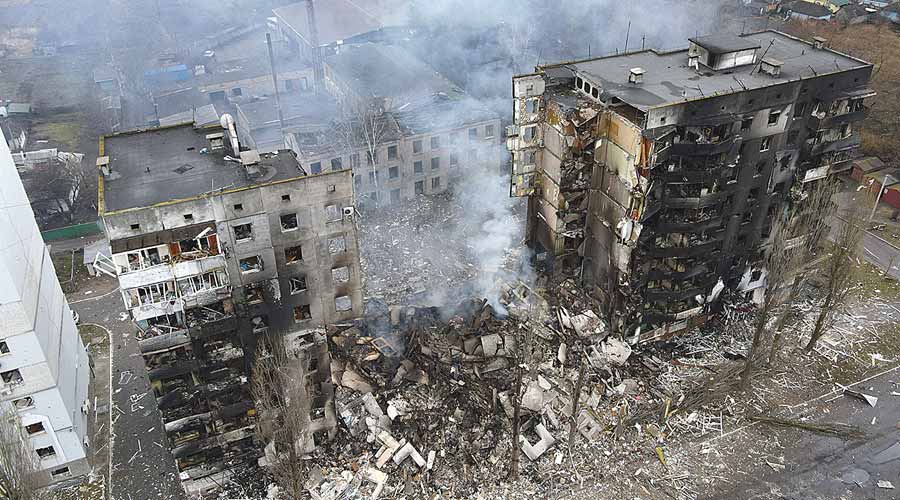Apart from being an outright violation of the principle of territorial integrity, rooted in the conception of Westphalian sovereignty that formed the fountain head of the modern, rules-based international system, Ukraine’s invasion is set to unleash multi-dimensional consequences within Europe and outside. Some of the changes seem to be obvious; the others will be subtle.
In the post-World War II phase, the Cold War led to sabre-rattling in Europe on both sides of the divide but the continent was largely spared of violence. The exceptions were the violence in the Balkans as the former Yugoslavia imploded after 1991, domestic insurgencies like those in Northern Ireland in the United Kingdom and in the Basque Country in Spain, and the colonial struggle of Algerian nationals in France. In this context, the impact of Ukraine’s invasion is consequential for Europe and non-European countries. An elaborate, dispassionate understanding of the context and the changes that the present crisis may trigger requires substantiation.
Within Europe, Ukraine’s invasion has revitalized the idea of the European Union and given it a renewed sense of purpose. Russia’s perceived threat is now internalized by eastern European Baltic states, such as Estonia, Latvia and Lithuania, which were earlier part of the Soviet Union, and by other eastern European countries like Poland, Romania and Moldova. This has instilled pan-continental unity that no single event has catalyzed since 1993, the year of the EU’s foundation. In terms of effects over Europe and beyond the region, Ukraine’s invasion is not analogous to what happened when Crimea was annexed from Ukraine in 2014 and parts of Georgia in 2008. The full-scale invasion of Ukraine is perceived as an existential threat even by Western Europe. Even Germany, Europe’s economic heavyweight, has announced it would invest more than two per cent of its gross domestic product in defence, which is seen as a watershed moment in the country’s post-World War II history.
Apart from sanctions on Russia, European countries are making a beeline to help Ukraine in various ways, including the supply of weaponry, to thwart the Russian invasion. The countries have reportedly decided to even send fighter jets to help Ukraine. Clément Godbrage, a Renaissance historian and one of the strong proponents of the European unity project, says that within Europe the attachment for unity in diversity is extremely strong; so “we are clearly seeing an important moment in the history of the EU”.
At present, within the European context, the discipline of security is strictly seen within a national prism. France and the UK have experienced terrorist attacks that have local specificity rooted in the challenges related to identity crisis — Islamophobia and the problems of assimilation in each one of these countries. The US security umbrella within the North Atlantic Treaty Organization has pretty much defined the security architecture of the continent. The result is that in the last two decades a vast chunk of young and middle-aged European talent, whether academics or practitioners, has been absorbed in Asia, Africa and the Middle East, courtesy peace projects sponsored by the EU or investment made by a European country bilaterally. There may now be more focus on redesigning and revitalizing independent European security architecture along with the setting up of supporting mechanisms in addition to strengthening existing platforms like the NATO.
The recent developments may return the intense focus on European security within the United States of America. During the Cold War or even in the 1990s, a sizeable portion of foreign policy expertise at the apex level was directed towards Europe or Russia. This can partly be explained by the fact that European immigrants or their parents had come to the US because of World War II and, thus, had a visceral understanding of Europe and Russia. Henry Kissinger, a first-generation German Jew, came to the US as a teenager and became one of the pivotal figures in the Richard Nixon administration as secretary of state. His expertise was on European political history in the 19th century although he was also the architect of the famous US détente with the People’s Republic of China. In the same vein, Kissinger’s rival, Zbigniew Brzezinski, with his Polish background, became the national security adviser in Jimmy Carter’s Democratic Party administration. His expertise was on Russia. Another eastern European, second-generation immigrant in the 1990s, who rose to the top as the first woman secretary of state, was Madeleine Albright. Even under George W. Bush, the first African-American secretary of state was Condoleezza Rice: her specialization was eastern and central Europe and the Soviet Union.
There are no easy choices for countries in the global South, including India, which depend on Russia for their weapons delivery systems. Outrightly condoning the Russian invasion of Ukraine is not the signal that these countries want to give within their own region as this would incentivize the regional bully. While abstaining at the United Nations Security Council and at the UN General Assembly on a resolution against Russian invasion, India decided to send humanitarian assistance to Ukraine. The Western sanctions on Russia will impose zero-sum choices on Russia’s trading partners in Asia and Africa who also trade with Europe or North America.
The invocation of selective historical interpretation by the Russian president, Vladimir Putin, to defend his invasion brings him in contestation with countries like Turkey that have their own relationship with the region. The old Ottoman empire included Crimea, parts of Ukraine and Central Asia. Most of the air routes from Europe to the Central Asian countries are through Istanbul. In Central Asia, the native language in Uzbekistan, Kazakhstan and Kyrgyzstan is of Turkic origin. Russian is also spoken in Central Asia because of its association with the former Soviet Union. In this respect, energy-rich Kazakhstan, one of Russia’s closest allies, has reportedly denied a request for its troops to join Russian forces in Ukraine even though Russian troops helped President Kassym-Jomart Tokayev quell protesters in January 2022.










